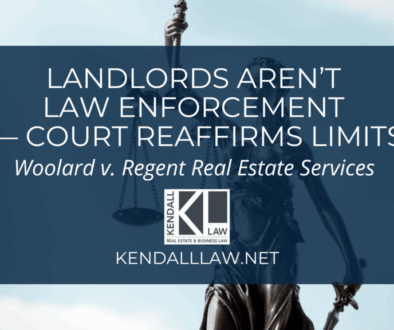What commercial landlords need to know in the time of COVID-19
The coronavirus is having a devastating effect on the United States economy and has caused many businesses to close. The greatest impact to commercial markets are in the areas of development, finance, hotel, retail and industrial sectors. The clear sentiment from around the world is that COVID-19 is going to negatively impact second quarter leasing, sales and investment activity in commercial property. In addition, with the mandatory closure of restaurants, bars, nightclubs, gyms, movie theaters and other entertainment-type venues, it has become exceedingly difficult for retail and office tenants to satisfy their rent obligations. As a result, landlords should take certain steps to proactively protect their investments.
Distressed tenants, specifically those in the most impacted markets, are under a substantial amount of pressure. Landlords should review the terms of their lease agreements to ensure that they fully understand their rights and obligations during this time. Landlords must be realistic in understanding that our current state of affairs is not “business as usual” and that their rights under their leases may be limited by law or social pressure. California Gov. Gavin Newsom issued Executive Orders which authorized local governments to halt residential and commercial evictions. In response the California Department of Business Oversight (DBO) announced that is has secured support from some of the largest banks and nearly 200 state-chartered banks for temporary delays in mortgage payments. Tenants received even more protection on April 6, 2020 when the California Judicial Council issued an emergency rule halting all eviction filings, commercial and residential, COVID related or not.
It is highly advisable for landlords to work with their tenants to devise creative solutions that would enable tenants to maintain operations while simultaneously allowing landlords to meet their own loan obligations. Landlords may wish to consider entering into a partial rent abatement agreement with their tenants. Such an agreement should contain defined reinstatement dates and a repayment schedule. Tenants will be impacted by this pandemic regardless of their landlord’s actions, however, a landlord’s willingness to evaluate alternate pay structures may be both beneficial in the long term and foster good will from their tenant. That said, landlords must first review their own loan documents to ensure that they are knowledgeable about how the requirements of those loans that effect their investments.
The question lingering in everyone’s minds is whether the federal government will step in and stop evictions as it did with single-family homes. (Under the Department of Housing and Urban Development’s Plan released on March 18, foreclosures and evictions would stop for 60 days on single-family homes with loans through the Federal Housing Administration). The consequences of paying rent on a location that is not in business will be a substantial blow to retailers. Rent is typically their major expense. Tenants are hopeful that their landlords will work with them on rent abatements or rent deferrals but the looming unanswered question is, “How long will this last?”
Meanwhile, according to media reports, the Trump administration is seeking to boost the economy through a stimulus package of between $850 billion to more than $1 trillion. This package could include $200 billion to $300 billion in direct relief to small businesses. The Federal Reserve has cut its benchmark interest rates to near zero in order to stimulate the economy, and plans to purchase at least $700 billion of assets.
While many retailers maintain business interruption insurance in conjunction with their commercial property insurance, a pandemic typically does not qualify as such. Business interruption coverage is intended to protect businesses against income losses sustained as a result of disruptions to their business operations. The coverage commences when the policyholder sustains “direct physical loss of or damage to” insured property. In the event of a claim for coronavirus-related business interruption, insurance carriers may dispute whether this “physical loss requirement” has been satisfied.
Additionally, many commercial property insurance policies provide coverage for business income losses sustained when a “civil authority” impairs or prohibits access to the policyholder’s premises. This “civil authority” coverage may or may not require that the access restriction result from “physical loss” by a covered cause of loss and, if so, often does not require that the “physical loss” occur to the policyholder’s own property. As a result, in the event that a governmental authority restricts access to the tenant’s premises, “civil authority” coverage may apply and provide coverage for lost income.
Moreover, there are additional specialized insurance policies and extensions added to standard property insurance policies. These most often apply to businesses in the health care or hospitality industry. The clauses provide coverage for losses caused by “communicable or infectious diseases” without requiring physical damage to the property.
Finally, tenants are questioning whether COVID-19 and its resulting business closures constitute a force majeure or “Act of God.” Force majeure clauses in insurance policies justify tenants’ suspension of their duties under their leases, including paying rent. Whether the pandemic is found to be a force majeure depends upon the specific contractual language of the policy, local law and the “causal connection between the pandemic and the particular tenant’s inability to meet its lease obligations.”
Black’s Law Dictionary explains that a force majeure is “meant to protect the parties in the event that a contract cannot be performed due to causes which are outside the control of the parties and could not be avoided by exercise of due care.” The majority of force majeure clauses specify that they are only invoked when performance becomes impossible.
As it applies to the coronavirus, tenants may have a strong argument that any broad force majeure clause should apply. First, it is undisputed that no tenant caused this pandemic to occur. In addition, many force majeure clauses include events like pandemics, epidemics and public health emergencies in their long list of qualifying events. Even without a specific reference to a “pandemic,” COVID-19 should qualify under most force majeure clauses due to the government-imposed quarantines. Next, to succeed in a force majeure claim, the tenant must establish it was unable to perform under its contract (i.e., pay rent) due to the coronavirus. To establish this causal connection, the coronavirus must be the true reason that the tenant cannot satisfy its contractual obligations. Finally, the tenant must demonstrate that there are no exceptions or exclusions that would prevent the applicability of the force majeure. For instance, some agreements may specifically exclude force majeure from events that could have been foreseen by a party or that are a result of a change in market conditions. In addition, the provision may include carve-outs, such as for a party’s payment obligations.
There is no doubt that the widespread coronavirus-related business lockdowns present an unprecedented challenge. It is highly likely that many businesses will not be able to pay their rent in full. With tenants not meeting their rent obligations, landlords may struggle to meet their own loan obligations. Unless the federal government intervenes, there is no easy answer. Even if a landlord evicts a tenant, it would be exceedingly difficult for a landlord to find a replacement tenant to take its place. The landlord’s dilemma remains how to satisfy the lender. As of this moment, banks have failed to offer relief to their landlord mortgagors. Commercial landlords and their tenants need a comprehensive solution: one that allows the tenant to stay in business while simultaneously assisting landlords with their own loan obligations.
Now, more than ever, landlords and tenants must cooperate in order to discover an avenue for businesses to stay afloat. Most national retailers have sent letters to their landlords requesting a deferral of rent until June 30. Payment arrangements vary considerably, however many landlords are allowing tenants to defer payments for up to 90 days. Some landlords are allowing tenants to attach payment onto the end of their lease, to be paid at its expiration while others are permitting tenants to pay deferred rent incrementally. In order for landlords to allow tenants the ability to defer payments, they will in turn need lenders to provide flexibility in their own mortgage payments. The ultimate solution is for the state and federal governments to support lenders via temporary monetary relief or through long-term incentives for offering flexible loan payments.
In these quickly changing times, it is imperative that commercial landlords understand their rights and obligations. If you are a commercial landlord, it is highly advised that you seek the counsel of an experienced and knowledgeable attorney. Eileen Kendall has represented real estate clients for over a decade. For a consultation contact Kendall Law or call (310) 619-4941.
Author: Eileen Kendall





